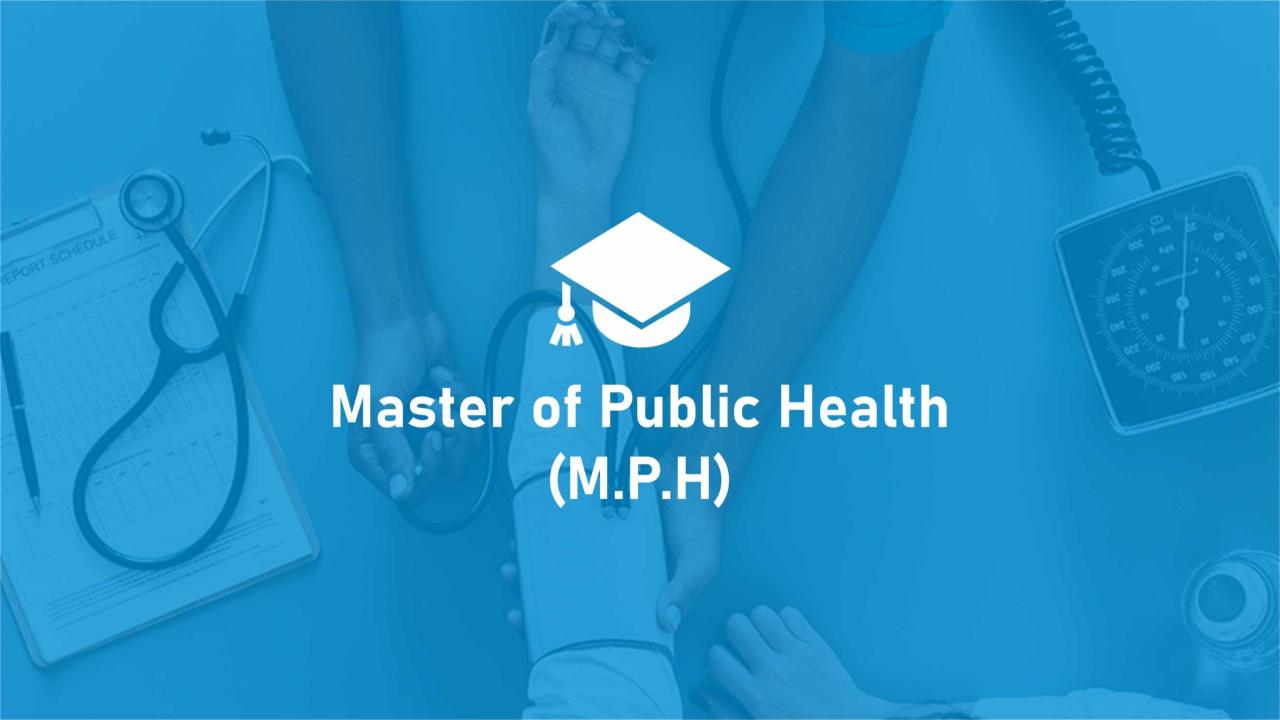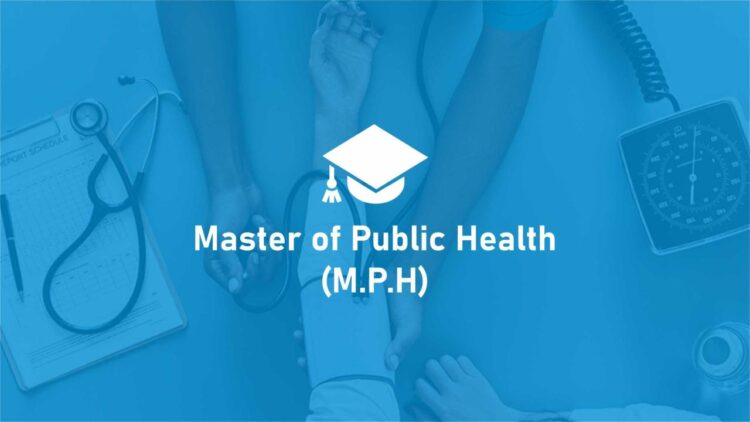
Definition and Overview
A Master’s in Public Health (MPH) is an advanced degree that focuses on the science and art of preventing disease, prolonging life, and promoting health through organized efforts and informed choices of society, organizations, public and private, communities and individuals. MPH programs provide students with the knowledge and skills necessary to address a wide range of public health issues, including chronic diseases, infectious diseases, environmental health, and health policy.
MPH programs typically offer a variety of specializations, allowing students to tailor their studies to their specific interests and career goals. Common specializations include epidemiology, biostatistics, environmental health, health policy and management, and social and behavioral sciences.
Program Structure and Curriculum
An MPH program typically comprises coursework, practicums, and research projects. The coursework provides a solid foundation in public health principles and practices, while practicums offer hands-on experience in real-world settings. Research projects allow students to apply their knowledge and contribute to the field.
Core Curriculum
The core curriculum of an MPH program typically includes courses in:
- Epidemiology: The study of the distribution and determinants of health-related states or events in specified populations.
- Biostatistics: The application of statistical methods to health-related data.
- Health Policy: The development and implementation of policies and programs to improve health outcomes.
Career Paths and Opportunities
Earning an MPH degree opens up a wide range of career paths in various sectors, including government agencies, healthcare organizations, and non-profit institutions. MPH graduates are equipped with the knowledge and skills to address public health challenges and promote population health.
Government Agencies
- Epidemiologist: Investigate disease outbreaks, identify risk factors, and develop prevention strategies.
- Public Health Policy Analyst: Develop, analyze, and evaluate public health policies and programs.
- Health Educator: Design and implement health promotion programs for diverse populations.
Healthcare Organizations
- Health Program Manager: Plan, implement, and evaluate health programs in clinical settings.
- Infection Preventionist: Develop and implement infection control protocols to prevent healthcare-associated infections.
- Clinical Research Coordinator: Manage clinical trials and collect data for research purposes.
Non-Profit Organizations
- Program Director: Lead and oversee public health programs for non-profit organizations.
- Community Outreach Coordinator: Engage with communities to raise awareness about health issues and promote healthy behaviors.
- Advocacy Specialist: Advocate for public health policies and programs at the local, state, and national levels.
Specializations and Concentrations
Master of Public Health (MPH) programs often offer specializations and concentrations to allow students to tailor their education to specific areas of public health practice. These specializations provide in-depth knowledge and skills in a particular field, preparing graduates for specialized roles within the public health workforce.
Epidemiology
Epidemiology focuses on the study of the distribution and determinants of health-related states or events in a population. Students in epidemiology specializations learn about disease surveillance, outbreak investigation, and the design and analysis of epidemiological studies. They develop skills in data collection, analysis, and interpretation, as well as the ability to communicate findings to inform public health policy and practice.
Health Policy
Health policy specializations prepare students to understand and analyze the development, implementation, and evaluation of health policies. They study the political, economic, and social factors that influence health policy decisions, and develop skills in policy analysis, advocacy, and communication. Graduates with a health policy specialization are well-equipped to work in government agencies, non-profit organizations, and other settings where health policy is developed and implemented.
Environmental Health
Environmental health specializations focus on the relationship between the environment and human health. Students learn about environmental hazards, their impact on health, and the principles of environmental health protection. They develop skills in environmental monitoring, risk assessment, and the development and implementation of environmental health programs. Graduates with an environmental health specialization are prepared for careers in environmental agencies, public health departments, and other organizations working to protect the environment and promote public health.
Accreditation and Certification

Accreditation is essential for MPH programs as it ensures that they meet specific quality standards and provide graduates with the necessary knowledge and skills to excel in the field. It demonstrates the program’s commitment to excellence and adherence to best practices.
There are various types of accreditation available for MPH programs, including:
Types of Accreditation
– Council on Education for Public Health (CEPH): The most widely recognized accreditation for MPH programs in the United States. CEPH-accredited programs meet rigorous standards in areas such as curriculum, faculty, and resources.
– Public Health Accreditation Board (PHAB): Accredits public health departments, agencies, and programs. PHAB-accredited programs demonstrate a commitment to quality improvement and continuous learning.
In addition to program accreditation, MPH professionals can also pursue individual certification to enhance their credibility and demonstrate their expertise.
Certification for MPH Professionals
– Certified in Public Health (CPH): A credential offered by the National Board of Public Health Examiners (NBPHE). It recognizes individuals who have met specific standards of education, experience, and examination.
– Master Certified Health Education Specialist (MCHES): A certification for health educators who have demonstrated advanced knowledge and skills in health education practice.
Accreditation and certification are valuable tools for MPH professionals as they provide assurance of quality, enhance credibility, and support professional development.
Research and Innovation
Research plays a pivotal role in Master of Public Health (MPH) programs, driving advancements and informing best practices in the field. MPH students engage in cutting-edge research projects that address pressing public health challenges, contributing to a deeper understanding of disease patterns, health disparities, and effective interventions.
Current trends in public health research include:
- Precision medicine: Tailoring treatments to individual genetic profiles.
- Artificial intelligence (AI): Using data analytics to identify risk factors and improve disease prediction.
- Global health: Addressing health disparities and improving health outcomes in underserved populations worldwide.
- Environmental health: Investigating the impact of environmental factors on health.
Collaborative Research
MPH programs foster collaboration between students, faculty, and researchers from diverse disciplines, including medicine, epidemiology, social sciences, and environmental sciences. This interdisciplinary approach enables the exploration of complex health issues from multiple perspectives and leads to innovative solutions.
Global Health
Global health is a critical component of MPH programs, recognizing the interconnectedness of health issues worldwide. It addresses health challenges that transcend national borders, focusing on improving health outcomes for populations globally.
Working in international public health settings presents both challenges and opportunities. Challenges include cultural and linguistic barriers, health system disparities, and resource constraints. However, these settings also offer opportunities for collaboration, innovation, and the application of public health principles to diverse populations.
Challenges in Global Health
- Cultural and linguistic barriers can hinder communication and understanding of health needs.
- Health system disparities may limit access to quality healthcare services.
- Resource constraints can affect the implementation and effectiveness of public health programs.
Opportunities in Global Health
- Collaboration with international organizations and local communities promotes knowledge sharing and capacity building.
- Innovation and adaptation of public health interventions to diverse settings foster creativity and problem-solving.
- Exposure to global health challenges broadens perspectives and enhances cultural sensitivity.
Community Engagement and Partnerships
Community engagement is a fundamental aspect of public health practice, as it enables practitioners to understand and address the unique needs and perspectives of the communities they serve. It involves actively involving community members in decision-making, program planning, implementation, and evaluation, ensuring that public health interventions are tailored to the specific context and values of the community.
Building and maintaining partnerships with community organizations is crucial for successful community engagement. These partnerships facilitate the sharing of resources, knowledge, and expertise, and help to ensure that public health initiatives are culturally appropriate, sustainable, and responsive to community needs. By fostering strong relationships with community organizations, public health practitioners can gain valuable insights into the social, economic, and environmental factors that influence health, and develop programs that are more likely to be effective and have a lasting impact.
Strategies for Building Partnerships
- Identify and engage with key community stakeholders: This includes community leaders, organizations, businesses, and residents who have a vested interest in public health.
- Establish clear communication channels: Open and regular communication is essential for building trust and maintaining strong partnerships.
- Foster mutual respect and understanding: Recognize and value the unique contributions of community partners, and strive to understand their perspectives and priorities.
- Share resources and expertise: Collaborate with community organizations to leverage their resources and expertise, and share public health knowledge and best practices.
- Evaluate and adapt: Regularly assess the effectiveness of partnerships and make adjustments as needed to ensure they continue to meet the evolving needs of the community.
Technology and Public Health
Technology plays a crucial role in advancing public health. Data analysis enables the identification of trends, patterns, and risk factors in health outcomes. Health informatics systems facilitate the efficient collection, storage, and analysis of health data, improving decision-making and resource allocation. Telehealth expands access to healthcare services, especially in remote or underserved areas.
Data Analysis
Data analysis helps public health professionals understand the distribution and determinants of health conditions. By analyzing large datasets, they can identify risk factors, predict outbreaks, and develop targeted interventions. For instance, using data analytics, researchers have identified factors associated with obesity and developed strategies to promote healthy eating habits.
Health Informatics
Health informatics systems, such as electronic health records (EHRs) and health information exchanges (HIEs), streamline the management and sharing of patient data. EHRs provide a comprehensive view of a patient’s health history, facilitating diagnosis, treatment, and follow-up care. HIEs enable the secure exchange of health information between different healthcare providers, improving coordination and reducing duplication of services.
Telehealth
Telehealth services, such as video conferencing and remote monitoring, extend healthcare access to individuals who face barriers to in-person care. Telehealth can provide consultations, diagnosis, and treatment for various conditions, including chronic diseases and mental health disorders. It has been particularly valuable during the COVID-19 pandemic, allowing patients to receive care from the safety of their homes.





